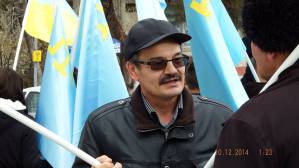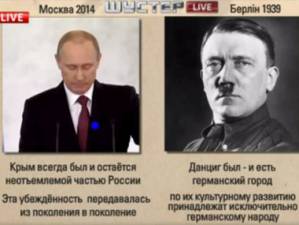5 years imprisonment for criticizing Crimean annexation and Putin?

Rafis Kashapov is facing a 5-year sentence, charged with ‘public calls to violate Russian territorial integrity’ and ‘hate speech’ for posts in VKontakte critical of Russia’s annexation of Crimea and aggression in eastern Ukraine.
The trial began on Friday, July 3 in Russia of 56-year-old Rafis Kashapov, head of the Tatar Public Centre, who has been held in detention since December 28, 2014, for social network posts in support of Ukraine and against Russian aggression.
He is charged with inciting hatred or enmity (Article 282 § 1 of the Criminal Code) and “public calls to actions aimed at violation of the Russian Federation’s territorial integrity” via the Internet (Article 280.1 § 2) and faces up to 4 years imprisonment on the first charge, and 5 on the second.
This is believed to be the first time that charges under Article 280.1 have reached the court. As reported, the new article came into force in May 2014 and there has been concern that it will be interpreted very loosely and used, for example, against Crimeans expressing their position that Crimea remains part of Ukraine, and should be under Ukrainian governance.
The charges which have already been used to hold Kashapov in detention for over 6 months and could lead to a long period of imprisonment pertain to four posts on VKontakte all of which are still available (and can be provided in full, should they be removed).

There is a brief post entitled Yesterday – Hitler and Danzig, today Putin and Donetsk! It shows pictures of Putin with the caption reading: “Crimea has always been and remains an inalienable part of Russia” and of Hitler saying “Danzig was – and is a German city”.
The text asserts that since Russia’s occupation of Crimea the new unrecognized authorities have been destroying everything Ukrainian and Crimean Tatar.
The text Crimea and Ukraine will be free of the occupiers! reports a demonstration in Ankara with banners reading, “Putin, get out of Crimea!” and calling both Stalin and Putin murderers. The protest, which Kashapov writes was supported by a large group of Crimean Tatars, was against a visit to the Turkish capital by Russian President Vladimir Putin. It criticizes the Turkish authorities for meeting with Putin and says that the latter is following Joseph Stalin’s tradition and carrying out a chauvinistic policy with respect to the Crimean Tatars. He mentions the 18 Crimean Tatars who have disappeared since Russia’s invasion and searches of homes, mosques and religious schools. He speaks of Russian “karateli” – those carrying out punitive operations and a term regularly used on Russian television but about Ukrainians.
In the post “Let’s defend Ukraine and the entire Turkic world!” Kashapov suggests among other things that Putin needs a victory over the Ukrainian people in order to remain in power. He says that Putin’s plan is to crush the Ukrainian revolution, destabilize the situation, etc. In short, roughly similar to what any number of analysts regularly write and exactly the position put in the report Putin. War that Boris Nemtsov was planning to write when he was gunned down outside the Kremlin in Feb 2015.
One final entry has a photo collage with the title “Where there’s Russia, there are tears and death”. The photos are from conflict in Moldova; Chechnya; Dagestan; Georgia and Ukraine.
An ‘expert assessment’ asserts that Kashapov’s texts deliberately stir up hatred to the following: “Russians”; “Russian authorities”, the Crimean “occupation authorities”; “President Vladimir Putin”.
Some of the comments by these ‘experts’ cannot strictly be called inaccurate. They say, for example, that Kashapov’s texts create a negative attitude to the actions of the Russian authorities in Crimea and the impression that the peninsula was illegally joined to Russia; and that it is not a part of Russia. They also assert that Kashapov calls to action to defend Crimea from Russian occupation.
Where they find the latter ‘calls’ is unclear. Certainly the Sova Centre which monitors hate speech and xenophobia found no grounds for the accusations against Kashapov who has been recognized as a political prisoner by the Memorial Human Rights Centre.
To be continued…





